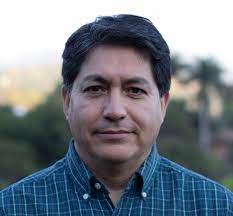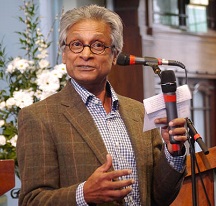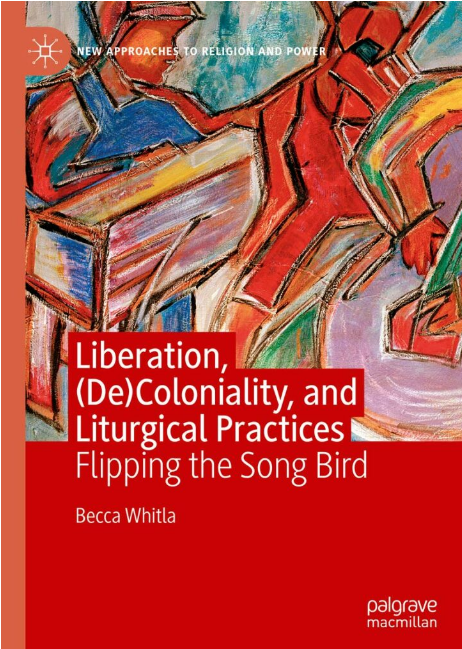Liberation, (De)Coloniality, and Liturgical Practices: Flipping the Song Bird. Palgrave MacMillan, 2020.
Becca Whitla uses liberationist, postcolonial, and decolonial methods to analyze hymns, congregational singing, and song-leading practices. By way of this analysis, Whitla shows how congregational singing can embody liberating liturgy and theology. Through a series of interwoven theoretical lenses and methodological tools—including coloniality, epistemic disobedience, mimicry and hybridity, border thinking, and ethnomusicology—the author examines and interrogates a range of factors in the musical sphere. From beloved Victorian hymns to infectious Latin American coritos; congregational singing to radical union choirs; Christian complicity in coloniality to Indigenous ways of knowing, the dynamic praxis-based stance of the book is rooted in the author’s lived experiences and commitments and engages with detailed examples from sacred music, and both liturgical and practical theology. Drawing on what she calls a syncopated liberating praxis, the author affirms the intercultural promise of communities of faith as a locus theologicus and a place for the in-breaking of the Holy Spirit.
Endorsements:

Becca Whitla turns liturgical practices and the discipline of liturgical theology on their heads by drawing on liberation and decolonial theoretical approaches. She demonstrates how song is a space where entire communities articulate their voices and identities as counter-narratives to empire.
Néstor Medina, Assistant Professor of Religious Ethics and Culture, Emmanuel College of Victoria University at the University of Toronto

Informed, incisive, subversive, and refreshing. Becca Whitla’s book betrays a deep hunger for just, inclusive, and embodied congregational singing. Turning up the volume and striking back at empire’s continuing grip on congregational singing/music, Whitla offers a positive vibration’ pulsating to the beat of urgent decolonial and interdisciplinary work in liturgy and practical theology.
Michael N. Jagessar, Mission Secretary – Europe, Council for World Mission
Review
What we sing matters. So does how we sing it. Our denominational hymnals bear witness to more than two thousand years of people singing their faith, in a range of cultures and contexts… In this book, Whitla draws extensively on her own experience as a liturgist and song leader over the course of more than four decades to understand the ways in which congregational singing can embody a liberating praxis of liturgy — and the many ways in which it so often falls short.
… Whitla calls us to be transformed and to transform, not only in the ‘what’ and ‘why’ of our singing, but especially in the ‘how.’ So, how will we, as people of faith, gather with one another and sing?
Zentner-Barrett, Joshua (2021) “Liberation, (De)Coloniality, and Liturgical Practices: Flipping the Song Bird,” Consensus: Vol. 42 : Iss. 2 , Article 19.
Available at: https://scholars.wlu.ca/consensus/vol42/iss2/19
Praise for Flipping the Song Bird
‘Singing in a decolonial key’ is the project here, with invigorating and demanding insights about how to achieve it. The cheeky sub-title—‘Flipping the Song Bird’—indicates the defiant energy at play as autobiographical narrative (in its work of ‘reconfiguring [the] self’) and liberation and contextual theologies (especially from Canadian perspectives) agitate against ‘musicoloniality.’ Sound/music, words, and performances all come in for scrutiny, as both questions arise of postcolonial theological strategies and proposals emerge towards a more liberating liturgical theology. The result is a very vivid picture of singing as ‘a living out of God’s image in us.’ Highly recommended!”
Stephen Burns, Professor of Liturgical & Practical Theology, Pilgrim Theological College, University of Divinity, Australia
Becca Whitla carefully and critically undertakes multiple discourses while grounding them in this project of liberating congregational singing. The arguments are well thought-out, finely crafted, deeply researched, and carefully nuanced. This book presents various examples to analyze, interrogate, and critique liberationist, decolonial, and postcolonial perspectives. It also presents a specific and practical place for these interrogations to occur, so the work of this thesis does not remain for the elite or the ivory tower of academia. I highly recommend this manuscript for anyone looking at religion and culture, liturgical studies, as well as liberationist, decolonial, and postcolonial thought-in-action.
Neomi De Anda, Associate Professor, Department of Religious Studies, University of Dayton, Ohio, USA and President of the Academy of Catholic Hispanic Theologians of the United States
In creative defiance of Cartesian assumptions, Becca Whitla flips the equation and declares We sing, therefore we are! Singing embodies community empowerment, not an individual cognitive state of being. Singing has a long history of subversion and, by implication, the potential for liberation. Whitla is not a casual observer of the liberating potential of singing, but an instigator of communal singing as a way of empowering those on the margins of privilege. Her passionate rhetoric—“Flipping the Song Bird”—is matched by a creative, provocative methodology exposing deep-seated colonial privilege as a façade for patriarchal power manifest in human oppression.
C. Michael Hawn, University Distinguished Professor Emeritus of Church Music, Southern Methodist University, USA
Here is the most rigorously sustained engagement in liberationist, postcolonial, and decolonial theory and theology yet in practical and liturgical theology. A host of hermeneutical tools that have previously tended to remain theoretical and abstract (e.g., border thinking, intermixture, hybridity, mimicry) come alive in Becca Whitla’s hands and are elegantly employed to original and empowering results. What starts out about congregational singing becomes nothing short of a hope-filled and Spirt-inspired call to conversion beyond Eurocentrism in music and liturgy, theology and faith.
William S. Kervin, Associate Professor of Public Worship, Emmanuel College of Victoria University at the University of Toronto, Canada
Drawing on a variety of social science methodologies, Becca Whitla examines the practice of congregational song music-making in a variety of contexts, particularly through a decolonial approach. This is an emerging area of study and the approach is ground-breaking. I foresee this work as generating vigorous discussions that will help further research work in the field for years to come.
Lim Swee Hong (林瑞峰), Deer Park Associate Professor of Sacred Music and Director, Master of Sacred Music program at Emmanuel College of Victoria University at the University of Toronto, Canada
Whitla’s book moves us into a profound reflection on the ways in which incarnational song guides us into a path that makes the invisible visible. She has obviously spent time in careful exploration and deep meditation on the symbiotic relationship between traditional liturgical music structures and the so-called anti-structure of other particular styles and genres. Whitla’s book will be of tremendous value to academia, the ministerial community, as well as the larger community of faith alike.
Cynthia A. Wilson, Executive Director of Worship Resources for Discipleship Ministries and Director of Liturgical Resources at United Methodist Church General Agency, USA
